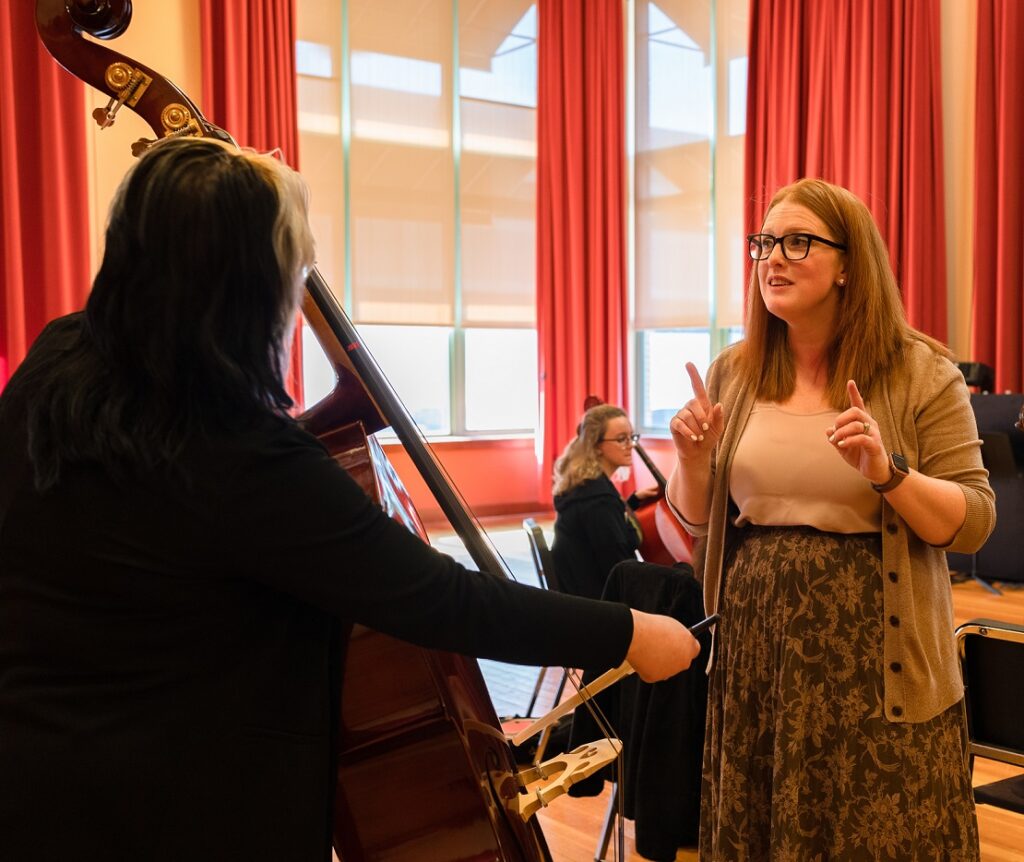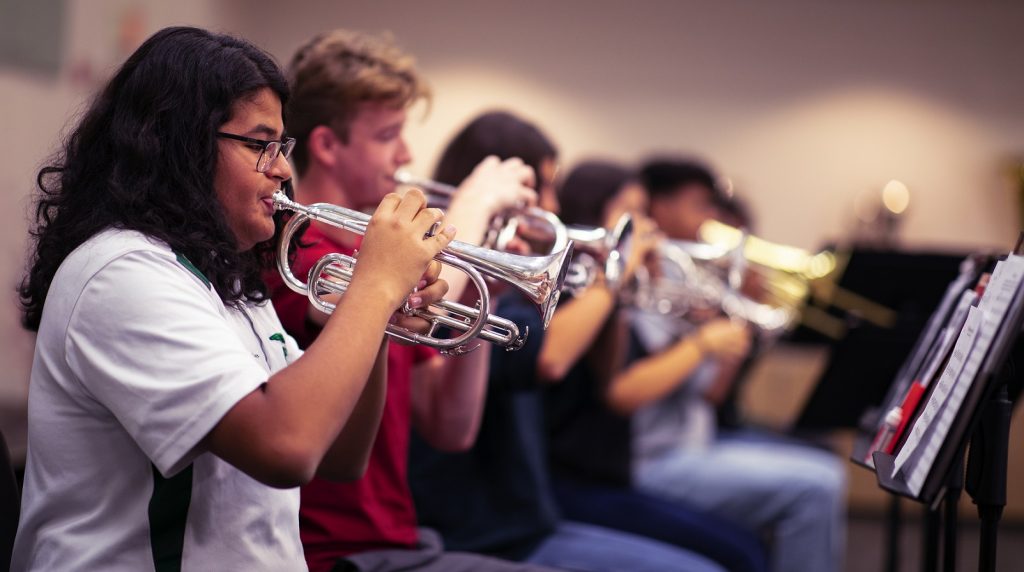Tagged Under:
How to Effectively Partner with School Administration
Fostering a close-knit teacher-administrator relationship will pay dividends for your music program.
I routinely witness music educators taking to social media to vent about a lack of support from school administrators. I have been there. Early in my career at an independent college-preparatory school, a newly hired headmaster attended my first choral concert of the semester and slept through a good deal of it. Much to my surprise, he called me into his office the following school day to tell me that the hour-long concert was “too long and too religious.” There was no conversation or space to provide rationale, only directives about what would be different moving forward.
The concert was in fact dominated by secular music and none of the sacred selections were devotional in nature (the only sacred repertoire on the program was a Mozart motet in Latin, a Mendelssohn anthem in German and an African-American spiritual), so I was not anticipating a need to defend my curriculum to a disapproving employer that morning! After stomaching the criticism, which was opposed to every measure of success that I had been taught, I left the meeting feeling frustrated and at an impasse.
Whether the particular frustration is regarding course offerings, scheduling, budget, administrative red tape, district-wide initiatives, program expectations, enforcement of policy and procedures, or teacher evaluations, music educators will undoubtedly experience some of these vexing encounters. The good news is: There is much that can be done to ensure a thriving relationship with your administration and mitigate unsupportive encounters!
Though the tenure of the administrator in my example was short-lived, I learned a valuable lesson. Quality teaching alone is no guarantee of administrative support. This particular interaction could have been averted if I had done some intentional advocacy work on the front end. Now, I’m in higher education, and I encourage my music education students to foster a close-knit relationship with their future administrators in several ways.
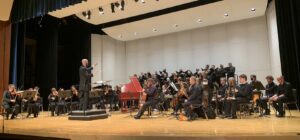
VISIBILITY
Because educators in the performing arts teach content that is specialized with methods that also require a specific set of skills, they are too frequently left alone and trusted to “do their thing” — particularly if they are well-qualified and well-liked. Early on in my career, I perceived this hands-off approach of my administration to be an indicator that things were going well. No news is good news! Also, who wants a micromanager for a boss? However, I learned that this approach can create several hurdles:
- Educators in the performing arts can often feel isolated without colleagues in the building who truly understand their needs, their curriculum or their approach.
- With distant leadership, successes may go unnoticed while challenges may linger.
- When issues arise, a trusting relationship based on direct experience is not established.
As I matured in my career, I realized the importance of keeping my instruction visible to administrators in a proactive, almost pestering, manner. At that independent school, I had never been observed in my music instruction, not a single lesson after my initial interview. As a result, my evaluators knew nothing of what I was doing apart from secondhand accounts or attending performances.
Inviting administrators into the classroom became a cornerstone of my advocacy strategy. Rather than waiting for required observations, I extended personalized invitations on a regular basis, encouraging them to witness firsthand the dynamic interactions and learning experiences taking place within the music program. And I asked that it be documented (which would become wonderful artifacts for future employers). In this way administrators will track growth, not only the final product. This proactive approach not only provided leadership with direct insight into the curriculum and pedagogy, but it also fostered a sense of investment and appreciation for the work being done.
Sharing the achievements and successes of my students became another vital component of my advocacy efforts. From simply announcing every student honor and recognition to highlighting every milestone of our choral program, great and small. I made a concerted effort to keep administrators informed and engaged. Do not be afraid to brag on your accomplishments and celebrate them publicly to demonstrate the tangible impact you are making. Flood your administrators’ email inboxes with the amazing things you and your students are doing and take-over the school announcements with kudos for your music students.
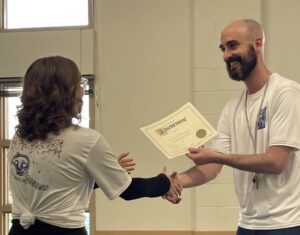
INVOLVEMENT
In addition to classroom engagement, I seized opportunities to involve administrators in my program’s special events, such as serving as chaperones for a choir tour that included attending a performance of “Hamilton” (my principal jumped at the opportunity). Personally invite them, and provide comp tickets, to the honor choir concert. Take your choir to their office to serenade them with “Happy Birthday!” Ask them to be a “practice audience.” These experiences will not only allow principals, assistant principals and deans to witness the passion and dedication of your students, but they will also foster personal connections and emotional ties to the music program. And if it so happens that on the bus to the choral festival you have an opportunity to highlight a tangible need — so be it! By bridging the gap between the administrative office and the music room, I was able to cultivate a supportive relationship that championed the success and growth of our program.
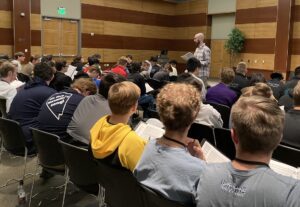
EDUCATION
Over time, I recognized the importance of taking initiative to educate administrators about the rationale for my curriculum and pedagogical approach. Before the year gets going, request a meeting to talk through any areas that could potentially cause heartburn. Why is it of value to learn and perform a mass movement by Franz Schubert? Why is a retreat for my Advanced Choir worth the investment? How will a subscription to a sight-reading technology impact the musical literacy of the 9th graders? Why might a co-curricular concert take priority over an extra-curricular sports practice? I worked to debunk some of the misconceptions regarding music education and, at the same time, garner their support and understanding. Through intentional dialogue, I was able to convey my expertise as well as the value and impact of music education on student development.
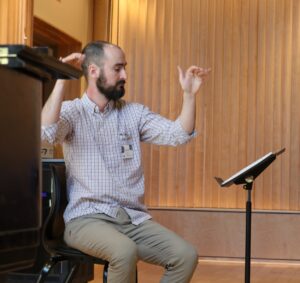
ALIGNMENT
I initiated annual conversations with administrators to discuss their goals and expectations for the music program, aligning them with my own objectives and aspirations. This collaborative approach not only ensured alignment of priorities but also provided a platform for mutual understanding and accountability. By actively involving administrators in the planning and decision-making, I fostered a sense of ownership and investment in the success of the music program. It is incredibly valuable to sit down, dream and visioncast. I proactively highlighted opportunities for growth and development, drawing attention to initiatives implemented in other schools that weren’t yet an opportunity at my school but could be adapted or adopted to enhance our program. By keeping leadership abreast of emerging trends and best practices in music education, I positioned myself as a proactive and forward-thinking educator, dedicated to continuous improvement and advancement.
In reflecting on my journey as a choral director, I have come to appreciate the transformative power of advocacy in building strong and supportive relationships with school administration. For me, advocacy meant keeping music education visible, involving administrators in every way I could, proactively educating them and aligning their goals with mine. Make the administrator’s office a space you frequent often — 90% of this time should be on your own initiative and 10% on theirs. In this way, I have experienced success cultivating a culture of support and collaboration that has enriched the educational experiences of my students. As music educators, we must recognize the importance of advocating for our students, our programs and our profession. And we must strive to foster meaningful partnerships with school administration that will ultimately strengthen the fabric of our school community.













